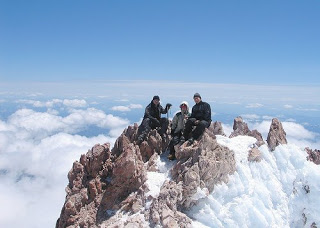Greatness is not a function of circumstance but a function first and foremost of constant choice.
What a great statement by Jim Collins, in his keynote for the Front End of Innovation. Every company has the opportunity to be great. Every company. He uses mountain climbing as an analogy to companies achieving greatness. It's a team journey, with success determined by "what you do to yourselves, rather than what the world does to you."
Key, of course, is to enable an organization to create environments of constant choice. Which might sound somewhat odd. Don't employees face choices every day? So let's clarify the meaning of this. Employees do indeed find themselves facing choices throughout their work days. Much of this is the minutiae we all do.
But that's not quite the same thing as creating an organization operating on constant choice. Consider that companies are complex organisms, faced with a daunting array of operational decisions every day. Employees are in the thick of it.
And every day, some of those employees are coming up with notions about ways to improve. Products and services. Field operations. R&D. Marketing. Changes in customer behavior. Sourcing.
Per Jim Collins, great organizations don't let existing processes and previous decisions simply override suggestions for improvement. They create scenarios where the organization is consistently challenged with new ideas. New choices.
Enabling an organization to capture these inflection points - both minor and major - is critical. Success with previous initiatives and processes can risk ossification of innovation, as anything that challenges current success is ignored. Setbacks are not taken as opportunities to innovate, but as exogenous blips that will pass.
As Collins recently wrote in Business Week:
Those in power start to blame external factors for setbacks rather than accept responsibility. The vigorous, fact-based dialogue that characterizes high-performance teams dwindles or disappears altogether.
Great organizations will constantly examine the happenings across all aspects of their business. And they need to leverage those who are most likely to encounter changes first - employees in their daily work routine.
This is where the rise of emergent social technologies becomes a great aid to companies. As ideas occur to employees, as they encounter the ongoing changes that characterize most industries, they have a place to share with their colleagues.
Consider how well your own organization is creating a culture of constant choice. As Collins notes, it's the difference between mediocrity and greatness.
Hutch Carpenter is Director of Marketing for Spigit. Spigit provides the most comprehensive innovation management platform for the enterprise, integrating emergent social collaboration with traditional workflow and analytics in innovation communities of employees, customers and partners.

